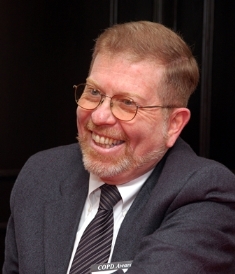Five Questions: Dr. Bartolome Celli

This post was compiled by Kristen Willard, M.S.
One of the regular features you will find on the PRAXIS Nexus will be called Five Questions. It’s just that; we will ask a professional from the COPD community to answer five questions about themselves and COPD care. We hope this new feature will bring you fresh information about some of your colleagues and the direction in which our collective work is headed.
In this installment, we are featuring Dr. Bartolome Celli, MD. Dr. Celli graduated from the Universidad Central de Venezuela in 1971 with the desire to be an excellent doctor, researcher and educator and embarked on a career to achieve those goals. Dr. Celli came to the United States and trained in Internal Medicine and Pulmonary Medicine and is currently a Professor of Medicine at Harvard Medical School.
Through research he has contributed to advances in COPD including: the relationship between arm movement and positioning; the act of breathing in the biped human; the function of respiratory muscles in hyperinflation; the development of guidelines for the diagnosis and management of COPD; and the determination of prognostic indicators of survival in COPD. He has also contributed to the description of the first array of gene expression in lung tissue in patients with COPD and the first use of proteomic profiling in the serum of such patients. In addition, he has been the Chairman of the Committee that established the American Thoracic Society and European Respiratory Society guidelines for the diagnosis and treatment of COPD.
Dr. Celli has devoted close to 30% of his time each to frontline medicine, research and education, continuing to be a practicing doctor without forgetting the academic side that he loves. Dr. Celli’s trainees are located in the United States, Europe, the Middle East, Japan and Latin America. He has instilled a love for pulmonary disease and life itself to medical residents and pulmonary and critical care fellows with the final aim of making the world a little better. Here are his responses to our Five Questions.
What is the biggest challenge you face in improving the lives of people with COPD?
The challenges remain many. Perhaps number 1 on the list is the misinterpretation of the symptoms of the patients, who believe that shortness of breath with progressively lower levels of effort is a natural consequence of aging and that cough and phlegm are the normal response to cigarette smoking (if they are still smoking or have smoked in the past). This leads to delayed or missed diagnoses, so most patients arrive to therapy relatively late in the course of the disease. Further, there is still a prevailing myth that COPD has no treatment and that there is little that can be done to improve the course of the disease.
What do you think is the single most promising practice in COPD diagnosis or care right now?
The most promising practices are: on the one hand, the adoption of spirometry as a test in many primary care offices and practices. This will hopefully increase early and correct diagnosis. The second is the continued effort of decreasing the habit of smoking and improving air quality. Both of these combined will decrease COPD prevalence and incidence as well as improve the benefits of therapy.
If you had a magic wand, how would you improve COPD care?
I would make sure that pulmonary rehabilitation as a component of integrated care would be available to every person diagnosed as having COPD. Such a program would not only concentrate on the appropriate medical therapy, but also in promoting healthy lifestyle (e.g., vaccines, exercise, nutrition). A move to make this an available resource to every person with COPD would certainly improve well-being and outcome.
What is one aspect of COPD diagnosis or care you think is too often overlooked?
A comprehensive plan that evaluates and then addresses not only the compromise of the respiratory system, but also the extra-pulmonary and systemic manifestations of COPD.
What do you think will be your most important contribution to improving the lives of people with COPD?
My most important contribution is to integrate patients into a movement to bring the whole agenda of COPD to full public attention. This will force agencies, insurers, payers and industry to devote resources to this scourge. We have seen the success of AIDS campaigns; why not COPD?
This page was reviewed on March 6, 2020 by the COPD Foundation Content Review and Evaluation Committee